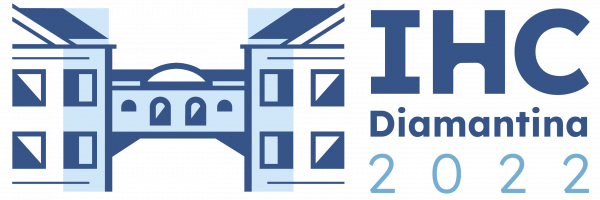Accepted Works and Program
17/10 (8h30 – 12h) – Como Organizar Hackathons Inclusivas? – George Valença (Universidade Federal Rural de Pernambuco), Rodrigo Santos (UNIRIO)
17/10 (08h30 – 17h30) – Introdução à implementação da acessibilidade dentro do design da experiência do usuário – Livia Martins (São Paulo State University – UNESP)
17/10 (14h – 17h30) – Uso do TAM – Technology Acceptance Model – no Ciclo de Design de Aplicações Computacionais – Matheus Cruz (Universidade Federal Fluminense), Flavia Bernardini (Universidade Federal Fluminense), José Viterbo (UFF), Érica Mourão (Universidade Federal Fluminense), Daniela Trevisan (Universidade Federal Fluminense)
19/10 e 20/10 (8h30 – 10h) – Thinking Doing Personas ágeis + Task Flow + exploração de ideias – Débora Gomes (UFMG), Karine Drumond (UFMG)
Call for papers
Short courses aim to present a general view on a trending and innovative research topic or technology related to human-computer interaction. Attendants should be able to learn about a new topic and apply it to their research and practice. Short courses have as target audience undergraduate and graduate students, faculty members, teachers and/or professionals, with no more than 30 attendants. Registration for each short course can be done separately, without the need to attend the conference as a whole.
Short courses must be planned for lasting either 3 or 6 hours, delivered either in Portuguese or English.
Proposals submission and selection
Submissions should be limited to two pages, either in Portuguese or English, using the ACM Primary Article Template. MS Word users should use the Interim layout.docx template and LaTex users should follow the Latex template 1.83.
Submissions must contain the following information:
- Title, authors and affiliations (short course proposals are not blind-reviewed);
- Type of short course: theoretical, practical or theoretical-practical;
- Justification (brief presentation of the relevance of the short course theme);
- Extended summary (brief explanation about what will be covered in each topic);
- Audience (indicate the target audience, the maximum number of participants, and state why the proposed course should attract the attention of such an audience. Explain and justify any prerequisites, in case they exist);
- Authors’ biographies (each author should be briefly presented);
- Duration of the course (either three or six hours);
- Language in which the course will be held (either English or Portuguese);
- Infrastructure and materials needed (such as post-its, flipcharts, slide projectors, etc.);
- References.
Authors should pay attention to the references format, according to the required template. Authors must submit their short course proposals in PDF format via JEMS.
Submissions will be reviewed and evaluated by at least two researchers from the HCI community. They will analyze the intersection between the short course proposal and topics related to the HCI area, and if the proposal is in the community’s interest.
Selected short courses
The authors of each selected short course must submit, as a final version, a two-page summary following the same template. It will be published in the Extended Proceedings of IHC 2022. Also, authors should provide participants with substantial and self-contained notes or slides, along with references for further research on the presented topics.
In case they are interested, authors can submit a book chapter as a pedagogical resource for the minicourse. The SBC template must be followed and the chapter must have at least 20 pages. If two or more chapters are submitted, they will be published in a short courses book on SBC OpenLib.
Authors must authorize the publication of the summary and notes from the short course in the IHC 2022 website. One lecturer for each short course will be granted a free registration in the conference.
Program Committe
Cristiano Maciel (UFMT)
Marcos Alexandre Rose Silva
Silvia Berenice Fajardo-Flores
Maria Villela (UFV)
Edna Canedo
Isabela Gasparini
Tiago Barros Pontes e Silva
Fernanda Lima
Amanda Melo
Ana Luiza Dias (EMBRAPA)
Luciana Zaina (UFSCar)
Eduardo Tanaka
André da Silva
Andre Freire (UFLA)
Andrey Pimentel
Bruna Rodrigues da Cunha
Coordination
José Viterbo Filho (UFF) – viterbo@ic.uff.br
Vinicius Carvalho Pereira (UFMT) – vinicius.pereira@ufmt.br
Important Dates
Submission deadline: Jul 28th, 2022, was Jul 14th, 2022
Notification of results: Aug 18th, 2022, was Aug 9th, 2022
Final version submission: Sep 16th, 2022, was Aug 16th, 2022
Delivery of short course materials: Sep 26th, 2022, was Sep 23rd, 2022

